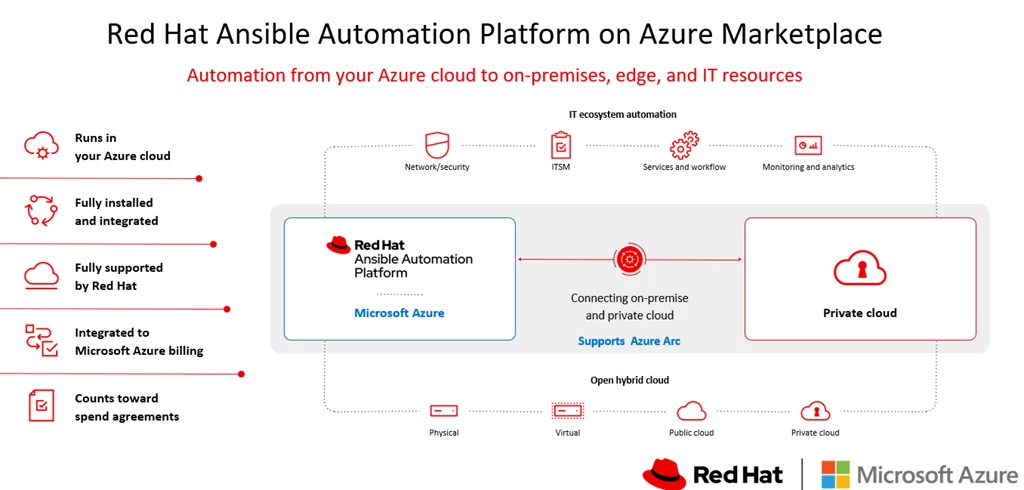Azure Arc, Hybrid + Multicloud, Thought leadership
Manage Red Hat workloads seamlessly on Azure
Posted on
3 min read
Every year, Red Hat Summit features inspirational and actionable content, industry-shaping news, and innovative practices from customers and partners. From hybrid cloud, containers, and cloud-native app platforms to management, automation, and more, speakers from around the world, across industries, and sectors join to share how they’re using open tools to build better solutions for themselves and their customers. Microsoft is proud to sponsor and participate in Red Hat Summit 2022 which brings together communities who are passionate about open source in the enterprise.
Business is changing, and keeping up with fluctuations in markets and customer demands is not easy. Modernization is essential. Technologies like containers, Kubernetes, and hybrid cloud architectures are key components that provide the scalability, innovation, and flexibility you need to maintain a competitive edge, grow market share, and increase margins. Microsoft and Red Hat offer you the tools to reduce complexity and simplify your environment, innovate faster, deliver high-quality customer experiences, and expand and scale your infrastructure in any direction so you can be a disruptor in your industry.
Today, we’re announcing multiple enhancements to our Red Hat on Azure offerings that help customers accelerate their digital transformation with the power of the cloud. This includes the broad availability of our Red Hat Ansible Automation Platform on Azure and Red Hat Open Shift Support for Azure Arc-enabled SQL Managed Instance.
Detailed updates include:
- Red Hat Ansible Automation Platform on Azure is now available to customers in North America with global availability coming soon. The Ansible Automation Platform 2.2 features are available for customers in the tech preview. Red Hat Ansible Automation Platform on Azure enables IT organizations to quickly automate and scale in the cloud, with the flexibility to deliver any application, anywhere, without additional overhead or complexity. Achieve zero to automation in minutes by deploying the managed application directly from the Azure Marketplace.

- Azure Arc-enabled SQL Managed Instance is now supported on Red Hat OpenShift. For Red Hat Enterprise Linux customers who need to run their data workloads outside Azure in their own datacenters or multicloud environments, we bring trusted Azure SQL and open-source software database services to meet them where they are. This database service unifies management and delivers mission-critical performance, high availability/disaster recovery at scale. With an evergreen SQL that has no end-of-support, customers can realize the best of Azure SQL on OpenShift, in any environment. Customers can enjoy fully automated updates and patches to innovate faster and be more secure.
“Red Hat has been a strategic partner in our Azure Arc partner ecosystem in lighting up the next-gen Azure data services to run anywhere. With this support, organizations can run Azure Arc-enabled SQL Managed Instance across any environment without worrying about the infrastructure underneath. The combination of RedHat OpenShift and Azure Arc-enabled SQL Managed Instance allows customers to use the platform they know and trust to accelerate innovation with faster time to market with enterprise-grade support.”—Peter Carlin, CVP Azure Database Platform
- Red Hat Enterprise Linux (RHEL) 9 will be available on Azure from May 24. With demand for edge computing continuing to grow, RHEL 9 incorporates key enhancements specifically designed to address evolving IT needs at the edge. Edge management helps teams more securely manage and scale Red Hat Enterprise Linux on distributed devices from a single interface. RHEL 9 will include support for Red Hat Update Infrastructure 4 allowing for automatic updates.
- Azure Hybrid Benefit for Linux 3.0 will be broadly available in early June. Through Azure Hybrid Benefit for Linux 3.0, customers can migrate their on-premises RHEL servers to Azure by bi-directionally converting existing RHEL pay-as-you-go (PAYG) VMs on Azure to bring-your-own-subscription (BYOS) billing, resulting in cost savings. In its latest iteration, support for custom images has been included. Read more about how Azure Hybrid Benefit for Linux for additional information.
Learn more
Visit the Microsoft Red Hat on Azure page to learn more about our offerings and join us at Red Hat Summit.